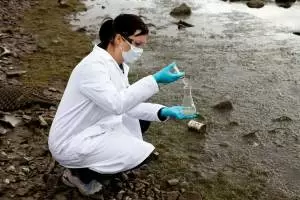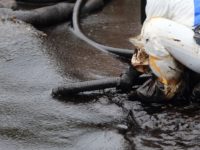
Environmental chemistry focuses on the presence and impact of chemicals in soil, surface water, and groundwater. Environmental chemists study how chemicals - usually contaminants - move through the environment. This is referred to as chemical “fate and transport”. They also study the effects of these contaminants on ecosystems, animals, and human health.
What Does an Environmental Chemist Do?
Environmental chemists advise on the movement and outcome of contaminants in soil and groundwater, assess long-term risks to ecological and human health, apply for environmental permits to undertake corrective strategies, classify contaminated soils as hazardous waste and manage their disposal, and supervise onsite remediation.
In addition to working in the field, the may also conduct laboratory work. For example, they may analyze chemical interactions or relationships using chromatography or spectroscopy techniques. They may also take measurements, interpret data, and use computers to model chemical fate and transport. Environmental chemists may also write reports or academic papers to communicate their findings to clients or colleagues.
Where Does an Environmental Chemist Work?
Most environmental chemists are employed by remediation firms and environmental consulting companies. Professionals in these positions may travel to reach job sites and meet with clients and legislators. These professionals have more interaction with others and greater variety of work than many other chemists who work in isolation in laboratories.
Environmental chemists may also work for state and federal government land management and regulatory agencies. They may also teach and conduct research as faculty members in academia.
Environmental chemists may be exposed to contaminants and hazardous conditions in the course of their work. Wearing protective equipment and following established safety procedures is important when working in a laboratory, or at a contaminated work site.
What Is the Average Environmental Chemistry Salary?
While the U.S. Bureau of Labor Statistics (BLS) doesn't collect information on environmental chemists specifically, the median salary for chemists and material scientists was $80,680 as of May 2020.*
Environmental Chemistry Jobs
Environmental chemists work mainly in applied fields analyzing new chemicals and their impact on the environment - they also study the environment's impact on newly created chemicals. While candidates seeking an environmental chemist job may pursue teaching or theoretical research, the larger demand is for these chemists to work in industrial or manufacturing settings. While responsibilities do vary significantly from company to company, the basic scope of an environmental chemist is responsible for can be found below:
- Develop data collection methods and systems according to the elements that are under study
- Collect information from observations, samples, and specimens
- Record and manage records of observations, samples and specimens in the lab and via fieldwork
- Use GIS and computer modelling to help forecast and analyze chemical impact
- Analyze literature, data, laboratory samples, and other sources of information to uncover primary, secondary, and tertiary chemical impacts
- Prepare reports and present research findings to internal and external stakeholders
- Communicate with team lead and executive through regular, scheduled reports and presentation of research findings
- Advise organizations and policymakers on the short and long-term impact and safety of chemicals in the environment
- Review research and literature in the field to stay abreast of current discoveries
A lead environmental chemist or chief researcher may have the following or similar additional responsibilities, depending on the project goals:
- Develop and inform project scopes, timelines, and budgetary metrics
- Assure quality, integrity, organization, and appropriate tracking of field and lab data
- Oversee site integrity to control for chemical impacts
- Manage office-based tasks including technical report preparation and submittal, as well as liaising with site stakeholders
- Be able to interact with ease while adhering to local norms and area customs
- Supervise fieldwork (survey, site recording, testing, monitoring, and data integrity) of one or more field crews
- Communicate with funding agencies and individuals through field status reports and presentation of team findings
What Is the Job Demand for Environmental Chemists?
BLS projects that the job demand for chemists will increase by about 6 percent between 2020 and 2030, with about 9,100 annual openings in the field projected during this time.*
What Do Environmental Chemists Study?
Environmental chemists usually have at least a bachelor's degree from an ACS-approved chemistry program. Seek out programs offering a concentration in environmental chemistry. Environmental chemists study environmental organic chemistry, a branch of chemistry focusing on how environmental factors influence the fate and transport of organic chemicals. For example, they may examine how air pollutants interact with atmospheric gases, or how plants metabolize and break down contaminants.
They develop a solid background in chemistry as a whole, including organic and biochemistry, and often study related disciplines such as oceanography, biogeochemistry, analytical methods, ecology, biology, geology, and engineering. Coursework generally includes several lab courses, as well as courses on mathematics. Knowledge of software for chemical analysis is also important.
Related Degree Options for Environmental Chemists
What kind of societies and professional organizations do Environmental Chemists have?
- The Society of Environmental Toxicology and Chemistry (SETAC) http://www.setac.org/ is a global professional organization that actively balances its focus among its academic, business, and government members. It develops and promotes multidisciplinary approaches to solving environmental problems, and provides a forum for sharing ideas. It holds annual meetings, offers short courses, and maintains regional branches and chapters, a job board, and a directory of graduate programs.
- The American Chemical Society (ACS) http://www.acs.org/ represents professionals at all degree levels and in all fields of chemistry, as well as other sciences that involve chemistry. It holds annual and regional meetings, and posts presentations from past national meetings online. It also offers workshops, short courses, and symposia related to the chemical sciences, and provides a portal to resources on green chemistry called the Green Chemistry Institute.
*2020 US Bureau of Labor Statistics salary figures and job growth projections for chemists and material scientists reflect national data not school-specific information. Conditions in your area may vary. Data accessed September 2021.





